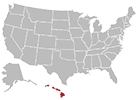
Hawaii too has many people with poor eye vision.
This can only mean there is a strong demand for opticians in this state.
Read this guide if you want to find out how you can become an optician in Hawaii.
Page Navigation
Optician Job Description and Duties in Hawaii
Not everyone can choose the right eyewear for their needs and preferences, and opticians are there to help with this.
Completing the following tasks is important for this goal:
- Preparing eyewear
- Fitting and adjusting eyewear
- Educating customers about eyewear issues and maintenance
- Keeping sales records
- Determining insurance co-pays
- Keeping the inventory
- Interacting with the labs that make lenses
Offering prescriptions for eyewear or inspecting the eyes is not part of an optician’s duties or responsibilities.
Optician Job Requirements in Hawaii
Hawaii is one of the states where opticians are required to hold a license if they want to practice.
The Hawaii Board of Dispensing Opticians and the Hawaii Department of Commerce and Consumer Affairs oversee opticians and issue licenses.
These bodies require individuals to pass 3 exams:
- National Opticianry Competency Examination (NOCE)
- National Contact Lens Registry Examination (NCLRE)
- Hawaii Professional and Vocational license (PVL)
Optician Education in Hawaii
Those who want to become licensed in Hawaii, need to complete one of the following:
- Have a high school diploma or GED and two years of work experience for a licensed optician
- Graduate from an accredited program for opticians
- Have a valid dispensing optician license from another state
Hawaii doesn’t have any schools that offer training to those who want to become opticians.
These individuals can enroll in either an accredited online program or a school in a different state.
Keep in mind that if you choose to apply at a college in a different state, you could be asked for:
- A high school diploma or GED
- Completing specific classes with a minimum grade of C
- 2 letters of recommendation
- OAT scores – not older than 5 years
- Minimum GPA of 2.75
The duration of the training course at a college varies based on the type of credential you’ll earn.
Usually, certificates are earned in about a year and degrees in at least 2years.
Most programs also include an internship, though it rarely is longer than 1 year.
Below is a list of a few of the topics you can expect studying in those programs:
- Introduction to Optometry
- Ocular Anatomy
- Systems 1: Neuroscience
- Ocular Microbiology
- Ophthalmic Imaging
- Public Health Optometry
- Glaucoma
- Physics
Those choosing the apprenticeship route need to ensure their employer holds a license as an optician, optometrist, or physician.
Optician Certification in Hawaii
As mentioned, in Hawaii, you’ll have to pass 3 exams before getting licensed.
NOCE is offered by the American Board of Opticianry (ABO) while CLRE is offered by the National Contact Lens Examiners (NCLE).
ABO and NCLE offer their tests at 3 different levels, both in English and in Spanish.
The levels are:
- Beginner
- Intermediate
- Advanced
As it deals only with spectacles, the topics for NOCE are:
- Reading prescriptions,
- Fitting and dispensing spectacles
- Using standard ophthalmic equipment
The CLRE covers these subjects:
- Pre-fitting for lenses,
- Diagnostic fitting,
- Dispensing of lenses,
- Patient education,
- Delivery
- Follow-up
Each exam costs about $200, generally covered by employers, and they’re usually organized at the Prometric testing centers.
Their passing score is 70%.
CLRE is needed only by opticians who need to work with contact lenses, though the majority of opticians choose to obtain this diploma as well.
The ABO-NCLE license expires every 3 years and it requires the opticians to continue their education.
The license from the Hawaii Board of Dispensing Opticians expires on July 1st during even-numbered years.
Optician Employment and Salary in Hawaii
Once you have your license, you can apply for a position at the following businesses:
- Stores
- Offices
- Optometry practices
- Hospitals
- Clinics
In Hawaii, opticians earn a higher average salary than their peers in most other states.
The table below shows actual numbers from the state’s main cities.
Annual Salary Range:Average Salary of Opticians in Hawaii
| City Name | Salary |
|---|---|
| Honolulu | $49,788 |
| Hilo | $49,451 |
| Pearl City | $49,788 |
| Waipahu | $49,765 |
| Kailua | $49,788 |
| Kaneohe | $49,788 |
| Kahului | $49,451 |
| Kihei | $49,451 |
| Kapolei | $49,675 |
| Wahiawa | $49,631 |
Regional Salary in Hawaii
| Region | Employed | Avg. Annual Salary | Avg. Hourly Pay | Top 10% Annual Salary | Bottom 10% Annual Salary |
|---|---|---|---|---|---|
| Urban Honolulu, HI | 120 | $53,860 | $25.9 | $72,860 | $35,590 |
* Employment conditions in your area may vary.
Additional Information for Opticians in Hawaii
If you help with continuing your education, use these resources:
- American Board of Opticianry and National Contact Lens Examiners (ABO-NCLE)
- Commission on Opticianry Accreditation
- Hawaii Board of Dispensing Opticians
- Hawaii Optometric Association




